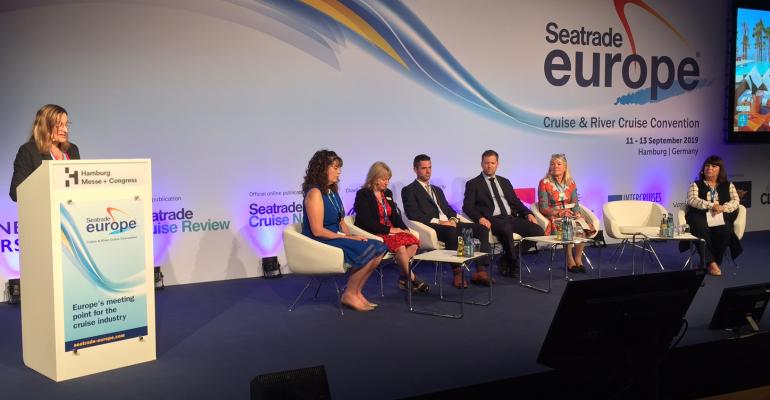Infrastructure investment should, however, not be the top priority for would-be destinations of small upmarket ships, cruise line representatives suggested at Seatrade Europe on Thursday
They claimed the focus should rather be on stakeholder management, developing authentic passenger experiences along with a related story and marketing tools, as well as education to ensure operational excellence.
Upmarket operators looking for surprise moments
Silversea's Justin Poulsen, Azamara's Gina Dunnett, Rob Kritzman of SeaDream Yacht Club and Saskia Vrolyk of Noble Caledonia represented the niche operators at the ‘Small is Beautiful’ conference session.
Analysing latest market trends, Kritzman claimed operators in the expedition and luxury sectors were increasingly looking for passenger experiences comprising a surprise moment, aiming to include at least one such event in any itinerary – whether it was associated with local culture or any other aspect of visited destinations.
Vrolyk suggested investments in the training of local guides should also be among the top priorities, as guides often turned out to be the key of success for destinations off the beaten track.
She suggested destinations targeting the small ships nice markets should work intensely to get consumers educated, particularly if the destination was less known or new to the market. ‘Tell your story, and give us your story’, she suggested, claiming educated passengers were creating better value for the port and for the cruise line.
Infrastructure not the top priority
In contrast to the strategies implemented by some new ports, the operators' representatives claimed investments into new infrastructure were not decisive for the success of a destination in the small ships sector.
Vrolyk stressed luxury and expedition ships were widely self sufficient and not dependent on terminals, not even necessarily for turnarounds. ‘It is all about experiences, not about size’ Dunnett added.
She also stressed the importance of an intense dialogue between ports and cruise lines, which could for example allow an upmarket ship top be alone in port – often an aspect appreciated by passengers.
Ratings evaluation critical for long-term success
Dunnett went into the topic of ratings collected among passengers by cruise lines, suggesting the respective results should be made available to all parties concerned, including ports and destinations. ‘Ask for feedbacks, ask for ratings’, she said directed to ports targeting luxury and expedition operators. Rating results were, as Dunnett claimed, after all critical for a destination's long-term success, as high scores much increased the chance to be included in future itineraries.
Determining the exact factors was a common task for all parties involved, something which required transparency and dialogue.
Customising and communication factor of success
Two destinations successfully addressing specifically small ships – Málaga Cruise Port with its 'El Palmeral' terminal as well as Visit Svalbard – were present on Thursday to share their experiences.
Eva-Britt Kornfeld, Director of Visit Svalbard (who is also active for Visit Oslo), claimed keeping an intense dialogue with incoming cruise lines was crucial to get to know each other and understand the customer cruise line's needs.
Referring to the Svalbard example, she presented the 'Town Hosts' project as well as newly developed community guidelines as innovations implemented this year in response to experiences gained in the past. While the guidelines strive to achieve better prepared visitors and more welcoming locals, the town hosts take incoming guests into town, giving them an individualised personal welcome, informing and advising them, and contributing to keep traffic smooth after cruise ship arrivals.
Susana Gutiérrez, GM of Málaga Cruise Port, claimed uniqueness was a key factor of success for any destination targeting small upmarket ships, requiring a careful understanding of the customers' needs along with respective customisation.
She admitted calls of small operators required much more time to be prepared than standard ship visits. Gutiérrez also supported Kornfeld's view that communication was critical to understand the need of upmarket cruise lines. She concluded that creating authentic experiences was not first and foremost a question of budget, but rather a question of changing minds.
Copyright © 2024. All rights reserved. Seatrade, a trading name of Informa Markets (UK) Limited. Add Seatrade Cruise News to your Google News feed.


